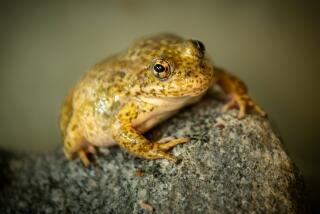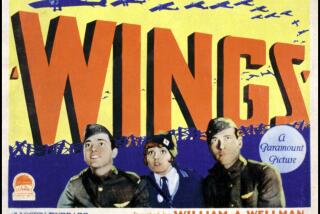Frog Jump Contest in Crisis Over Extra-Large Leapers
SAN FRANCISCO — Jumpin’ jiminy! Can it be? Is someone really trying to slip a ringer into the celebrated jumping frog contest of Calaveras County?
Contest organizers said Monday that a Seattle man, a professional importer of exotic animals, has created a “superfrog crisis” by trying to enter three eight-pound Goliath frogs in the whimsical contest made famous by Mark Twain.
“It would be like racing draft horses against Thoroughbreds,” complained Diane Baumann of the 39th District Agricultural Assn., which runs the annual contest as part of the Calaveras County Fair in May. “It’s just not fair.”
Baumann said the district’s board of directors will meet in executive session--that is, in secret--on Friday to discuss what to do about the giant amphibians.
Thirty years ago, the board dealt with the entry of tiny but long-leaping African runted frogs by requiring that all entrants be at least four inches long.
That old rule is no problem for these new African entrants. The man who is entering them, Andy J. Koffman, says his frogs are close to 10 times that big. And, he claims, he has seen Goliath frogs leap 30 or 40 feet in a single bound.
The jumping-frog contest record--for a combined total of three leaps from the center of a 35-foot-diameter stage--is 21 feet, 5 3/4 inches. Anyone who beats that record wins $1,000 on top of the $500 annual first prize, Baumann said.
Koffman asserts that his entrants can easily shatter that record with just one jump--and are more than likely to vault entirely off the stage and into the large crowd that gathers in the Central Sierra to see the event.
Scientists are skeptical. David B. Wake, a professor of integrative biology at the University of California at Berkeley, said the world record for frog jumping is only 32 feet, 3 inches--for three leaps--by a Rana oxyrhynchus in Cape Town, South Africa, in 1954.
“They (Goliath frogs) are big, but languid,” Wake said. “I’d be surprised if they jumped very far at all. If he says they can jump 40 feet, I’d have to say, ‘Show me.’ ”
Which is precisely what Koffman, a former California resident, wants to do. “I believe it is the destiny of these frogs to win this contest,” he said.
“I understand what people are saying, that it’s not fair for these giant frogs to compete,” Koffman said in a telephone interview conducted over the cackle of the exotic birds he keeps in his house. “But they are what they are: They’re just frogs.
“Other countries bring in athletes and naturalize them so they can compete in the Olympics,” he added. “I see this as the same thing.”
Organizers of the fair, held in the old mining town of Angels Camp about 110 miles east of San Francisco, are not so sure. For one thing, one of Koffman’s frogs is the size of an entire family of the common California bullfrogs that normally hop to fame in the tongue-in-cheek competition.
Koffman said his frogs are up to 3 1/2 feet long and weigh up to eight pounds--”I have some 12-pounders on the way that I want to enter, too,” he said.
Koffman said he was amazed--and instantly attracted to entering the frogs at the Calaveras contest--when he saw one leap the 40-foot width of a river in Cameroon. He was on a parrot-hunting expedition at the time, he said, but he turned his attention to capturing some of the “hundreds” of giant frogs he found. Koffman said he brought back 50 and sold most of them to zoos.
He said he still has 20 of the creatures bounding around a specially heated pool in his basement at home.
His frogs’ leaping skill frightens contest organizers for two reasons: fairness and safety.
“We try to run a fair contest here--may the best frog win, as they say,” Baumann said. “We’re not sure any of the other frog jockeys would bother to enter if they didn’t think they had a chance to win.”
Even if Koffman were to jump his frogs alone, she added, there is the fear that one of the frogs, weighing half as much as a bowling ball, might injure a spectator.
“I personally do not want to go to court on a personal injury lawsuit where someone gets whiplash after being hit by a frog,” she said.
Tradition is another concern to contest organizers, she added. After all, Mark Twain’s story recounted how gold-seeking sourdoughs sought to rig the contest with a domestic scam--feeding buckshot to competing frogs. Nowhere in the story is there a mention of going overseas for an advantage.
“We’re taking it quite seriously,” she said. “All kidding aside, it is a very serious concern to us.”
Not the least of those concerns is the possibility of a lawsuit by Koffman to force his frogs into the fray. The Seattle adventurer did not dismiss that possibility. “I think I have a right to jump in the contest.” But he did say he is only looking for a few laughs, and maybe a little publicity.
“I don’t want to upset anybody or make people angry,” he said. “I just want to go there, jump my frogs and have some fun.”
In any case, he added, he may not be the shoo-in contest organizers fear.
Eleven other potential competitors have already contacted him about buying frogs to enter themselves.
More to Read
Sign up for Essential California
The most important California stories and recommendations in your inbox every morning.
You may occasionally receive promotional content from the Los Angeles Times.







